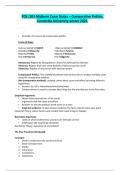Exam (elaborations)
POLI 203 Midterm Exam Notes – Comparative Politics Concordia University winter 2024
- Course
- POLI 203
- Institution
- Concordia University ( )
POLI 203 Midterm Exam Notes – Comparative Politics Concordia University winter 2024
[Show more]



